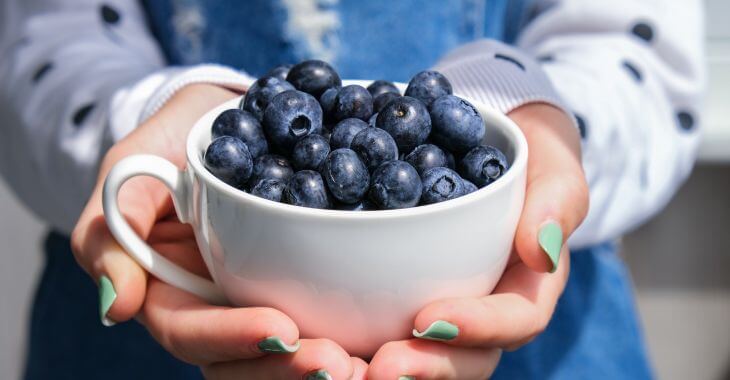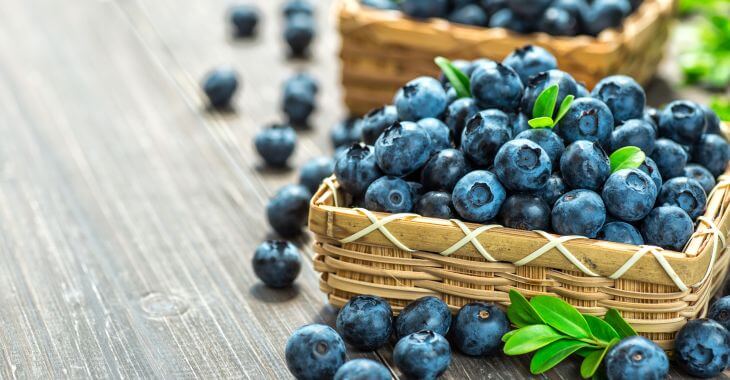Are Blueberries Acidic? Learn More About Low Acid Fruits

Blueberries are renowned for their health benefits, but many people wonder about their acidity levels. Are blueberries acidic? The short answer is yes—but there is more to the story, especially if you are watching your diet for acid reflux or digestive health.
Understanding the Acidity of Blueberries
Blueberries have a pH between 3.1 and 3.4, which technically makes them acidic. However, their acidity is mild and generally well-tolerated by most people, even those with sensitive stomachs. Their health benefits often outweigh their slight acidity.
Health Benefits of Blueberries
Despite being slightly acidic, blueberries are packed with antioxidants, especially anthocyanins, which support heart health and brain function. They also possess anti-inflammatory properties and serve as a good source of vitamin C, vitamin K, and fiber.
Why Does Fruit Acidity Matter?
If you suffer from acid reflux, GERD, or digestive sensitivity, eating high-acid fruits may worsen symptoms. Low-acid diets can help reduce heartburn, indigestion, and other discomforts. Knowing the acidity of fruits is crucial for managing these conditions that are triggered by acidity.
What makes a fruit “low acid?” Generally, fruits with a pH above 4.6 are considered low-acid fruits. These fruits are less likely to aggravate acid reflux and can be easier on the digestive system. Many fruits in this category still provide fiber, vitamins, and antioxidants, as well as wonderful flavors.
For some people, even mildly acidic foods like blueberries can trigger symptoms. If you have GERD, it is best to monitor your body’s response. You may still be able to enjoy blueberries in moderation, especially when paired with low-acid foods.
What are the best ways to eat blueberries on a low-acid diet? Pairing blueberries with oatmeal, almond milk, or whole grains can help buffer the acid. Blending them into smoothies with low-acid fruits, such as bananas or melons, is another smart way to enjoy their benefits while minimizing the risk of reflux.
Are Grapes Acidic?
You may also be asking, “Are grapes acidic?” Yes, they are, especially green grapes, which have a pH around 2.8 to 3.8. Red grapes tend to be slightly less acidic. Like blueberries, grapes are nutritious but may trigger symptoms in sensitive individuals.
What Are Other Low-Acid Fruits?
Looking for a low-acid alternative to grapes or blueberries? Here are some common low-acid fruits that are gentler on the stomach:
- Bananas (pH 5.0 – 5.3)
- Cantaloupe (pH 6.1 – 6.5)
- Watermelon (pH 5.2 – 5.6)
- Papaya (pH 5.2 – 6.0)
- Figs (pH 5.0 – 5.5)
- Avocados (pH ~6.3)
These fruits are ideal for people with acid sensitivity.
Are Citrus Fruits Off Limits?
Citrus fruits like oranges, lemons, and grapefruits are very acidic, with pH values ranging from 2.0 to 4.0. If you’re avoiding acid, it’s best to limit these. Try substituting citrus with papaya or cantaloupe for a similar flavor profile with less acidity.
How Do You Measure Fruit Acidity?
Acidity is measured using the pH scale. The lower the pH, the more acidic the fruit. Foods with a pH below 4.6 are considered highly acidic. The pH scale ranges from 0 to 14, with 7 being neutral. Understanding this helps guide your food choices.
Ripeness also affects acidity. Unripe fruits are often more acidic. For instance, green bananas have higher acidity than ripe bananas. Climate and soil can also play a role. Organic or locally grown fruits may have different acidity levels than imported ones.
Cooking and Processing Reduces Acidity
Cooking fruits can slightly reduce their acidity. For example, blueberries in baked goods may be less irritating than those eaten raw. This method can help people who want the flavor and nutrients without the acid-related side effects.
Should You Avoid All Acidic Fruits?
Not necessarily. Many acidic fruits are rich in nutrients and safe for most people. The key is understanding your personal tolerance and balancing acidic fruits with low-acid fruits to maintain a varied and healthy diet.
If you are dealing with digestive issues, try focusing on fruits that are less likely to trigger symptoms. Mix in neutral options like pears or apples (without the skin), which are mildly acidic but generally well-tolerated.
A Balanced Approach
Rather than avoiding blueberries or grapes entirely, it is more effective to eat them mindfully. Combine them with other foods, watch portion sizes, and avoid consuming them on an empty stomach if you are prone to reflux or heartburn.
Speak With a Healthcare Provider
If you regularly experience discomfort after eating acidic foods, consult a healthcare professional. They can help determine if your symptoms are related to acid reflux, food intolerance, or another issue that may require dietary changes or medication management.

The Bottom Line on Blueberries
So, are blueberries acidic? Yes, but their health benefits may still make them a great addition to your diet—especially when balanced with low-acid fruits. Understanding acidity can help you make smarter food choices for your body and lifestyle.
The information provided on this website, including text, graphics, images, and other materials, is intended solely for informational purposes and should not be used as a substitute for professional medical advice, diagnosis, or treatment.




)